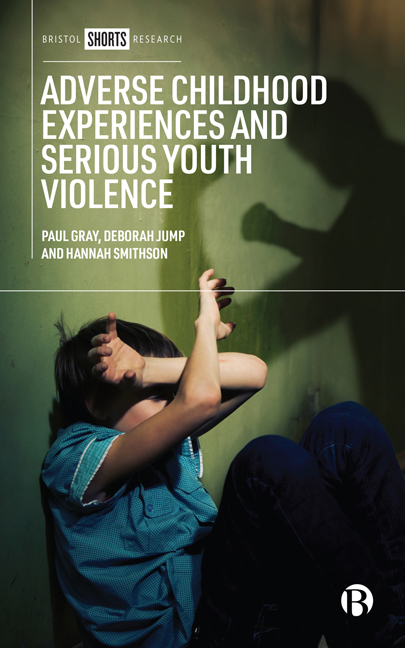Book contents
- Frontmatter
- Contents
- List of Figures and Tables
- Acknowledgements
- One Introduction
- Two Review of the Literature
- Three Researching Adverse Childhood Experiences and Trauma
- Four Serious Youth Violence
- Five Adverse Childhood Experiences
- Six The Relationship between Adverse Childhood Experiences and Serious Youth Violence
- Seven Trauma-informed Practice
- Eight Conclusions
- Notes
- References
- Index
Seven - Trauma-informed Practice
Published online by Cambridge University Press: 18 January 2024
- Frontmatter
- Contents
- List of Figures and Tables
- Acknowledgements
- One Introduction
- Two Review of the Literature
- Three Researching Adverse Childhood Experiences and Trauma
- Four Serious Youth Violence
- Five Adverse Childhood Experiences
- Six The Relationship between Adverse Childhood Experiences and Serious Youth Violence
- Seven Trauma-informed Practice
- Eight Conclusions
- Notes
- References
- Index
Summary
There is that real balance within the youth justice [system] about understanding that we’re working with victims as well as perpetrators, and we need to tackle both.
(Drama therapist [DT] 1)As outlined in Chapter 2, from 2016 onwards there has been a growing awareness of the importance of delivering trauma-informed practice within a youth justice context (Liddle et al 2016; Cordis Bright 2017; Glendinning et al 2021). Bearing in mind the prevalence of adverse childhood experiences (ACEs) among justice-involved young people (see Chapter 5), and the complex relationship between ACEs and serious youth violence (SYV) (see Chapter 6), it is clear that a trauma-informed approach is essential when working with perpetrators of SYV. Yet despite this awareness, the actual delivery of trauma-informed practice with justice-involved young people can be challenging. Before moving on to discuss these challenges, however, this chapter will first outline the strengths of a trauma-informed approach.
Strengths of a trauma-informed approach
The Substance Abuse and Mental Health Services Administration (SAMHSA 2014) report that was drawn upon in Chapter 2 is arguably one of the most comprehensive documents relating to trauma-informed approaches and trauma-informed care. In addition to developing a robust concept of trauma and how it manifests in individuals, the report presents a viable framework for embedding trauma-informed practice into public health agencies and organizations, ranging from education to social care and criminal justice. According to SAMHSA, the concept of trauma-informed practice requires agencies and organizations to apply the principles of trauma-informed care to all areas of their functioning. Working in trauma-informed ways requires ‘all people at all levels of the organization or system [to] have a basic realization about trauma and understand how trauma can affect families, groups, organizations, and communities as well as individuals’ (SAMHSA 2014: 9). With this approach in mind, a young person's violent behaviour should be understood in the context of coping strategies designed to survive adversity and trauma, whether this occurred in the past or is occurring at present.
- Type
- Chapter
- Information
- Adverse Childhood Experiences and Serious Youth Violence , pp. 84 - 99Publisher: Bristol University PressPrint publication year: 2023



